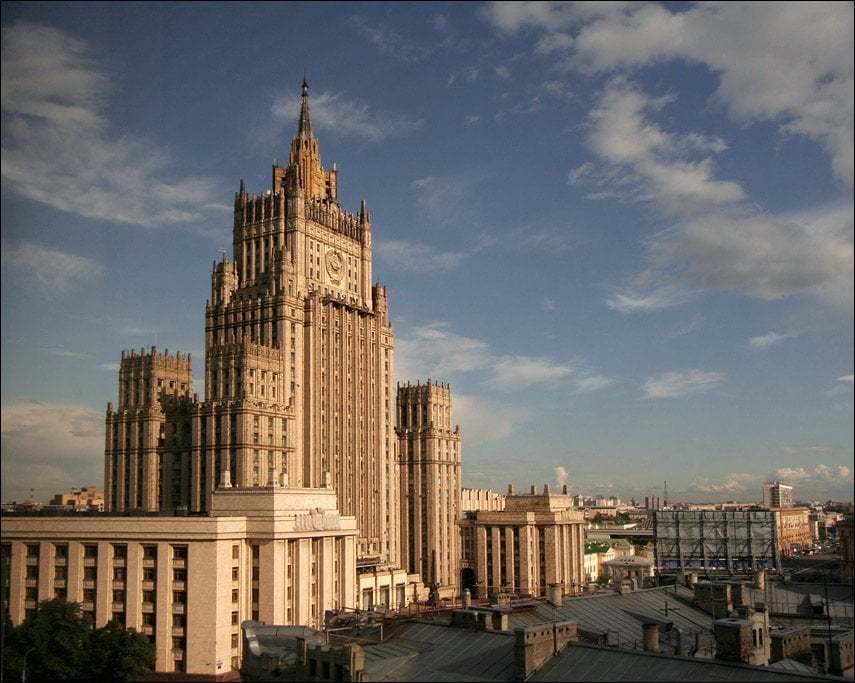Responding to Washington’s response to its so-called security guarantees, the Russian Foreign Ministry said today the U.S. has not given a constructive response to their demands, meaning refusal from further expansion of NATO.
Moscow says NATO’s backtracking on its 2008 Bucharest Summit pledge that “Ukraine and Georgia will become NATO members” and refusal to establish military bases in non-NATO, former USSR states are of “fundamental importance” to Russia.
The full text of Moscow’s reaction in Russian was published by Russia’s TASS news agency. The Russian Foreign Ministry’s website remained inaccessible for the time being.
The Russian Foreign Ministry (MID) says it expects “concrete proposals from members of the alliance on the content and forms of legally securing the renunciation of NATO’s further eastward expansion.”
MID claims that “increasing U.S. and NATO military activity directly at Russian borders is alarming, while our ‘red lines’ and inherent security interests, as well as Russia’s sovereign right to defend them, continue to be ignored.”
“In the absence of a willingness on the part of the U.S. side to agree on firm, legally binding guarantees to ensure our security on the part of the U.S. and its allies, Russia will be forced to respond, including by implementing measures of a military and technical nature,” Moscow asserts.
MID also asserts that “the ultimatums to withdraw troops from certain areas on Russian territory, accompanied by threats of tougher sanctions, are unacceptable and undermine the prospects for real agreements.”
Moscow is also accusing Washington that “the package nature” of its proposals are ignored while U.S. selected “convenient” topics for the West for further discussions with Moscow.
The Ukraine Question
MID claims there is no “Russian invasion” in Ukraine, and that there are no plans to do so, and that it regards talks about “Russian responsibility for the escalation” around Ukraine as an attempt to devalue proposals on “security guarantees.”
Moscow is dismissing its obligations under the Budapest Memorandum of 1994, claiming the document “has nothing to do with the internal Ukrainian conflict.”
It says loss of territorial integrity by the Ukrainian state is the result of “coup d’état” in Kyiv in 2014, going on to claim that amid attempts to create a “nationalist state” in Ukraine in the aftermath of Maidan, “it is not surprising that the people of Crimea voted for reunification with Russia.”
“The question of Crimea’s belonging is closed,” Moscow declares.
MID says if Ukraine is accepted into NATO, “there will be a real threat that the regime in Kyiv will try to “return” Crimea by force, dragging the U.S. and its allies [into conflict].”
The Russian Foreign Ministry claims causes for the conflict in Donbas “are purely of an intra-Ukrainian nature” and that it can only be resolved through the implementation of the Minsk accords.
Moscow deems the following steps as essential for the de-escalation of the situation around Ukraine: “forcing Kyiv to implement a set of measures, halting the supply of weapons to Ukraine, withdrawing all Western advisers and instructors from Ukraine, refraining NATO countries from any joint exercises with the Ukrainian armed forces and withdrawing all foreign weapons previously supplied to Kyiv outside Ukrainian territory.”
Other Issues
MID reckons that the stationing of Russian armed forces of the Russian territory cannot affect the fundamental interests of the U.S., while Western forces in the Eastern Europe endangers its interests.
“We insist on the withdrawal of all U.S. military forces and armaments stationed in CEE, SEE and the Baltic States. We are convinced that the national capabilities in these zones are quite sufficient.”
In its response-to-response document, Moscow also continues to make the case for the “principle of the indivisibility of security.”
Accusing Washington of creating advantages for itself and its allies “at the expense of Russia’s security interests,” Moscow slams “the unrestrained implementation by NATO, with the U.S. in the lead, of a policy of unlimited geostrategic and military development of the post-Soviet space, including the territory of Ukraine, which is especially sensitive to us.”
Albeit taking note of Washington’s suggestion to work on individual arms control and risk reduction measures, and multiple other issues, Russia says its “proposals are of a package nature and should be considered as a whole without singling out its individual components.”
While Moscow insists on barring Georgia from NATO membership, overwhelming majority of Georgians back integration into the Alliance.
According to recent poll by National Democratic Institute / CRRC, 77% approve the Georgian government’s stated goal to join the North Atlantic Treaty Organization, 11% disapprove, while 12% respond don’t know.
The support towards joining NATO is the highest in Tbilisi, the capital city with 80%, while the figures stand at 78% for other urban areas and 73% for rural communities.
Youngsters in 18-34 age group are the most supportive to the goal with 84%. People between 35 to 54 back NATO integration with 75%, while 71% of those above 55 share the same opinion.
Also Read:
- NATO Defense Ministers Restate Commitment to Open Door Policy
- Russia Urges NATO Disavow Georgia, Ukraine Membership Promise
- Georgia Condemns Duma’s Appeal for Donetsk, Luhansk Independence
- On Unity Day, Ukraine Receives Georgian Letters of Support
This post is also available in: ქართული (Georgian) Русский (Russian)

